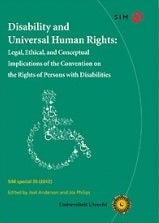
Edited by Joel Anderson and Jos Philips
Utrecht University (October 2012)
ISBN: 9789039358634
194 pages
Freely available online here.
Reviewed by HHR editorial assistant Krista Oehlke
As editors Joel Anderson and Jos Philips bring into focus in this new volume, the 2008 UN Convention on the Rights of Persons with Disabilities (CRPD) created a paradigm shift for human rights – strengthening State obligations for the disabled, reinforcing their positive rights, and broadening understandings of discrimination. In this three-part book, philosophers, lawyers, and social scientists address this shift through an interdisciplinary lens: a lively discussion that considers all angles of the CRPD and its widespread implications for human rights.
The book begins with essays that set the background and context of the CRPD, tracing its historical development and spirit, while essays in the second section explore the Convention’s transformative aspects. An ethics-focused critique reframes disability as “a fundamental part of the human diversity,” while an additional view sets forth that the Convention “contains a richer concept of discrimination than had been used before.” The book concludes with scholarship that confronts issues of priority setting that may arise in relation to the CRPD.
Policymakers and practitioners in the disability and human rights movements will appreciate original research and analysis of the Convention, including detailed analysis of its guidance on the rights of people with disabilities in the context of voting and sports. Written by a multidisciplinary research group, Disability and Universal Human Rights will have practical appeal and value to a diverse audience.
